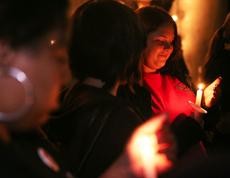Gathered in the darkness, hundreds of people applauded those who spoke out against sexual violence.
Take Back the Night, a national event to create awareness for Sexual Assault Awareness month, was held Tuesday night in the Women’s Plaza of Honor.
“”It’s important because, as statistics show, one in four women will be a victim of rape or sexual assault,”” said Malia Uhatafe, a religious studies senior and Women’s Resource Center director. “”Especially on this campus where a majority of our students are women, someone close to them will be affected by it.””
Entirely organized by students, the event brought together many organizations including fraternities, the Social Justice League, the WRC and the Student Health Advisory Committee, said Erin Good, violence prevention specialist with the Oasis Program.
The event kicked off with a solidarity march, which started at the Martin Luther King, Jr. building and continued down First Street, Good said. The march started 175 people strong but grew to around 600 people as other students joined in.
“”We had women and men from the sororities and fraternities come out and join us,”” she said. “”There were people waiting on the lawn at Delta Gamma and there were people waiting on the lawn at Alpha Delta Pi.””
The march concluded at the Women’s Plaza of Honor for a resource fair, survivor speak out and candlelight vigil.
Throughout the night, four scheduled speakers talked about their experiences with sexual assault and gave messages of empowerment to the hundreds of people gathered.
“”We want to send a clear message that sexual violence, and violence in any form, will not be tolerated at this campus. We want a safe campus and we deserve it,”” Good said.
According to the Rape, Abuse and Incest National Network, college-age women are four times more likely to be sexually assaulted.
Sexual violence doesn’t only affect women, Uhatafe said; men can become victims as well.
The stigma that surrounds sexual assault makes it difficult for victims to speak out, Good said.
“”As we say, (sexual assault) thrives in silence,”” she said. “”We don’t like to talk about it. It’s scary.””
Events like Take Back the Night create awareness and make it easier to talk about sexual violence, said November Papaleo, a Women’s Studies Department graduate teaching assistant.
“”It’s not by staying silent that these issues are addressed,”” she said.
Papaleo offered her students extra credit to attend the event because it’s something she cares about and she said part of being a teacher is encouraging students to get involved.
Stephanie Wilhelm, a pre-nursing sophomore and a student in Papaleo’s class, said she has heard about the dangers on campus.
“”Especially being on a college campus, you hear stories all the time about girls walking home from the dorms and stuff bad things happen,”” Wilhelm said.
Resource tables, run by organizations like the WRC and Planned Parenthood, were set up at the event as resources for victims and those interested in bringing awareness to sexual assault. Two tables were reserved for creating t-shirts with sayings of strength and survival on them and several shirts were hung around the plaza.
Good said the shirts were part of The Clothesline Project, which gives a visual representation of people who have been affected by violence.
Not only does sexual assault affect many people, but it has been “”a tool of power and control for ages,”” Good said. Although sexual assault has been around for millennia, “”people always found a way to resist it and to thrive and to be resilient, to tap into the power to overcome it and to be survivors,”” she said.









